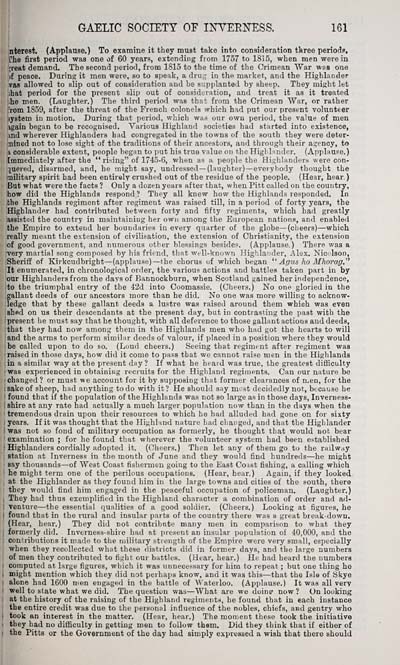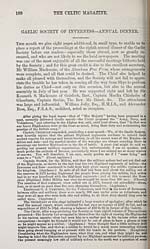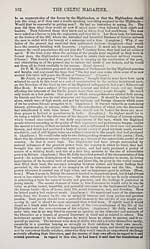Blair Collection > Celtic magazine > Volume 5
(171)
Download files
Complete book:
Individual page:
Thumbnail gallery: Grid view | List view

GAELIC SOCIETY OF INVERNESS. 161
nterest. (Applause.) To examine it they must take into consideration three period?.
The first period was one of 60 years, extending from 1757 to 1815, when men were in
;reat demand. The second period, from 1815 to the time of the Crimean War was one
)f peace. Daring it men were, so to speak, a dru_; in the market-, and the Highlander
VM allowed to slip out of consideration and be supplanted by sheep. They might let
;hat period for the present slip out of considtration, and treat it as it treated
;he men. (Laughter.) The third period was that from the Crimean War, or rather
'rom 1859, after the threat of the French colonels which had put our present volunteer
lystem iu motion. During that period, which was our own period, the value of men
igain began to be recognised. Various Highland societies had started into existence,
md wherever Highlanders had congregated in the towns of the south they were deter-
mined not to lose sight of the traditions of their ancestors, and through their agency, to
1 considerable extent, people began to put his true value on theHigl Imder. (Applause.)
[mmediately after the " rising" of 1745-6, when as a people the Highlanders were con-
quered, disarmed, and, he might say, undressed — (laughter)— everybody thought the
military spirit had been entirely crushed out of the residue of the people. (Hear, hear.)
But what were the facts ? Only a dozen years after that, when Pitt called on the country,
how did the Highlands respond ? They all knew how the Highlands responded. In
bhe Highlands regiment after regiment was raised till, in a period of forty years, the
Highlander had contributed between forty and fifty regiments, which had greatly
assisted the country in maintaining her own among the European nations, and enabled
the Empire to extend her boundaries in every quarter of the globe— (cheers) — which
really mesint the extension of civilisation, the extension of Christianity, the extension
of good government, and numerous other blessings besides. (Applause.) There was a
very maitial song composed by his friend, that wtll-known Highlander, Alex. Nicilson,
Sheriff of Kirkcudbright — (applause)— the chorus of which betjan " Affus ho Mhoj'ag,"
It enumerated, in chronological order, the various actions and battles taken part in by
our Highlanders from the davs of Bannockburn, when Scotland gained her independence,
to the triumphal entry of the 42d into Coomassie. (Cheers.) No one gloried in the
gallant deeds of our ancestors more than he did. No one was more willing to acknow-
ledge that by these gallant deeds a lustre was raised around them which was even
shed on us their descendants at the present day, but in contrasting the past with the
present he must say that he thought, with all deference to those gallant actions and deeds,
that they had now among them in the Highlands men who had got the hearts to will
and the arms to perform similar deeds of valour, if placed in a position where they would
be called upon to do so. (Loud cheers.) Seeing that regiment after regiment was
raised in those days, how did it come to pass that we cannot raise men in the Highlands
in a similar way at the present day? If what he heard was true, the greatest diiBculty
was experienced in obtaining recruits for the Highland regiments. Can our nature be
changed ? or must we account for it by supposing that former clearances of men, for the
sake of sheep, had anything to do with it? He should say most decidedly not, because he
found that if the population of the Highlands was not so large as in those days, Inverness-
shire at any rate had actually a much larger population now than in the days when the
tremendous drain upon their resources to which be had alluded had gone on for sixty
years. If it was thought that the Highlind nature Lad changed, and that the Highlander
was not so fond of military occupation as formerly, he thought that would not bear
examination ; for he found that wherever the volunteer system had been established
Highlanders cordially adopted it. (Cheers.) Then let any of them go to the railw.iy
station at Inverness in the month of June and they would find hundreds — he might
say thousands— of West Coast fishermen going to the East Coist fishing, a calling which
he might term one of the perilous occupations. (Hear, hear.) Again, if they looked
at the Highlander as they found him in the large towns and cities of the south, there
they would find him engaged in the peaceful occupation of policeman. (Laughter.)
They had thus exemplified in the Highland character a combination of order and ad-
venture — the essential qualities of a good soldier. (Cheers.) Looking at figures, he
found that in the rural and insular parts of the country there was a great break-down.
(Hear, hear.) They did not contribute many men in comparison to what tbey
formerly did. Inverness-shire had at present an insular population of 40,000, and the
confributions it made to the military strength of the Empire were very small, especially
when they recollected what these districts did in former days, and the large numbers
of men they contributed to fight our battles. (Hear, hear.) He had heard the numbers
computed at large figures, which it was unnece.«sary for him to repeat ; but one thing ho
might mention which they did not perhaps know, and it was this — that the Isle of Skye
alone had 1600 men engaged in the battle of Wateiloo, (Applause.) It was all very
well to state what we did. The question was— What are we doine now ? On looking
at the history of the raising of the Highland regiments, he found that in each instance
the entire credit was due to the personal influence of the nobles, chiefs, and gentry who
took an interest in the matter. (Hear, hear.) The moment these took the initiative
they had no difficulty in getting men to follow them. Did they think that if either of
the Pitts or the Government of the day had simply expressed a wish that there should
nterest. (Applause.) To examine it they must take into consideration three period?.
The first period was one of 60 years, extending from 1757 to 1815, when men were in
;reat demand. The second period, from 1815 to the time of the Crimean War was one
)f peace. Daring it men were, so to speak, a dru_; in the market-, and the Highlander
VM allowed to slip out of consideration and be supplanted by sheep. They might let
;hat period for the present slip out of considtration, and treat it as it treated
;he men. (Laughter.) The third period was that from the Crimean War, or rather
'rom 1859, after the threat of the French colonels which had put our present volunteer
lystem iu motion. During that period, which was our own period, the value of men
igain began to be recognised. Various Highland societies had started into existence,
md wherever Highlanders had congregated in the towns of the south they were deter-
mined not to lose sight of the traditions of their ancestors, and through their agency, to
1 considerable extent, people began to put his true value on theHigl Imder. (Applause.)
[mmediately after the " rising" of 1745-6, when as a people the Highlanders were con-
quered, disarmed, and, he might say, undressed — (laughter)— everybody thought the
military spirit had been entirely crushed out of the residue of the people. (Hear, hear.)
But what were the facts ? Only a dozen years after that, when Pitt called on the country,
how did the Highlands respond ? They all knew how the Highlands responded. In
bhe Highlands regiment after regiment was raised till, in a period of forty years, the
Highlander had contributed between forty and fifty regiments, which had greatly
assisted the country in maintaining her own among the European nations, and enabled
the Empire to extend her boundaries in every quarter of the globe— (cheers) — which
really mesint the extension of civilisation, the extension of Christianity, the extension
of good government, and numerous other blessings besides. (Applause.) There was a
very maitial song composed by his friend, that wtll-known Highlander, Alex. Nicilson,
Sheriff of Kirkcudbright — (applause)— the chorus of which betjan " Affus ho Mhoj'ag,"
It enumerated, in chronological order, the various actions and battles taken part in by
our Highlanders from the davs of Bannockburn, when Scotland gained her independence,
to the triumphal entry of the 42d into Coomassie. (Cheers.) No one gloried in the
gallant deeds of our ancestors more than he did. No one was more willing to acknow-
ledge that by these gallant deeds a lustre was raised around them which was even
shed on us their descendants at the present day, but in contrasting the past with the
present he must say that he thought, with all deference to those gallant actions and deeds,
that they had now among them in the Highlands men who had got the hearts to will
and the arms to perform similar deeds of valour, if placed in a position where they would
be called upon to do so. (Loud cheers.) Seeing that regiment after regiment was
raised in those days, how did it come to pass that we cannot raise men in the Highlands
in a similar way at the present day? If what he heard was true, the greatest diiBculty
was experienced in obtaining recruits for the Highland regiments. Can our nature be
changed ? or must we account for it by supposing that former clearances of men, for the
sake of sheep, had anything to do with it? He should say most decidedly not, because he
found that if the population of the Highlands was not so large as in those days, Inverness-
shire at any rate had actually a much larger population now than in the days when the
tremendous drain upon their resources to which be had alluded had gone on for sixty
years. If it was thought that the Highlind nature Lad changed, and that the Highlander
was not so fond of military occupation as formerly, he thought that would not bear
examination ; for he found that wherever the volunteer system had been established
Highlanders cordially adopted it. (Cheers.) Then let any of them go to the railw.iy
station at Inverness in the month of June and they would find hundreds — he might
say thousands— of West Coast fishermen going to the East Coist fishing, a calling which
he might term one of the perilous occupations. (Hear, hear.) Again, if they looked
at the Highlander as they found him in the large towns and cities of the south, there
they would find him engaged in the peaceful occupation of policeman. (Laughter.)
They had thus exemplified in the Highland character a combination of order and ad-
venture — the essential qualities of a good soldier. (Cheers.) Looking at figures, he
found that in the rural and insular parts of the country there was a great break-down.
(Hear, hear.) They did not contribute many men in comparison to what tbey
formerly did. Inverness-shire had at present an insular population of 40,000, and the
confributions it made to the military strength of the Empire were very small, especially
when they recollected what these districts did in former days, and the large numbers
of men they contributed to fight our battles. (Hear, hear.) He had heard the numbers
computed at large figures, which it was unnece.«sary for him to repeat ; but one thing ho
might mention which they did not perhaps know, and it was this — that the Isle of Skye
alone had 1600 men engaged in the battle of Wateiloo, (Applause.) It was all very
well to state what we did. The question was— What are we doine now ? On looking
at the history of the raising of the Highland regiments, he found that in each instance
the entire credit was due to the personal influence of the nobles, chiefs, and gentry who
took an interest in the matter. (Hear, hear.) The moment these took the initiative
they had no difficulty in getting men to follow them. Did they think that if either of
the Pitts or the Government of the day had simply expressed a wish that there should
Set display mode to: Large image | Transcription
Images and transcriptions on this page, including medium image downloads, may be used under the Creative Commons Attribution 4.0 International Licence unless otherwise stated. ![]()
| Early Gaelic Book Collections > Blair Collection > Celtic magazine > Volume 5 > (171) |
|---|
| Permanent URL | https://digital.nls.uk/76450933 |
|---|
| Description | Volume V, 1880. |
|---|---|
| Shelfmark | Blair.6 |
| Attribution and copyright: |
|
| Description | A selection of books from a collection of more than 500 titles, mostly on religious and literary topics. Also includes some material dealing with other Celtic languages and societies. Collection created towards the end of the 19th century by Lady Evelyn Stewart Murray. |
|---|
| Description | Selected items from five 'Special and Named Printed Collections'. Includes books in Gaelic and other Celtic languages, works about the Gaels, their languages, literature, culture and history. |
|---|

